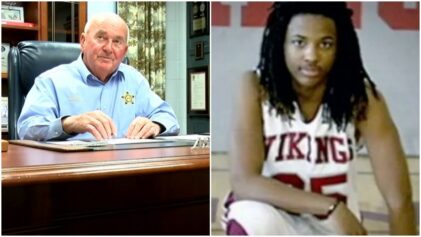The question of how Kendrick Johnson died, which has consumed his family since the 17-year-old Georgia athlete was found dead inside a rolled-up gym mat in January, took a troubling turn yesterday when his parents revealed that their son was buried without his internal organs and his body was filled with newspaper.
The parents believe he was killed, and they have hired Tallahassee, Fla.-based attorney Benjamin Crump, who rose to prominence representing the family of slain teenager Trayvon Martin. Crump has pursued several civil rights cases against law enforcement agencies.
“This is a real-life murder mystery where these parents sent their child to school with a book bag and he was returned to them in a body bag,” Crump told the Associated Press. “They brought me in to make sure this is not able to be swept under the rug in small-town Georgia and they never get justice for their child.”
After the body of Kendrick was found Jan. 11 in south Georgia, Lowndes County sheriff’s investigators concluded that he died in a freak accident, falling head first into an upright mat and becoming trapped. But Johnson’s family never believed that.
His parents made their gruesome discovery when Johnson’s body was exhumed over the summer for a second autopsy.
“I feel outraged about them stuffing my son’s body with newspaper,” Jacquelyn Johnson said.
Crump said the discovery raises questions about why Johnson’s organs were missing and couldn’t be examined in the follow-up autopsy.
“When you think about it logically, it seems to be some kind of conspiracy to conceal the truth about what happened to Kendrick and who did it to him,” Crump said.
Sheriff Chris Prine has said he suspected Johnson became trapped trying to retrieve a shoe that fell into the center of the large, rolled mat, and a Georgia Bureau of Investigation medical examiner concluded that he died from positional asphyxia when he got stuck and couldn’t breathe.
But after Kenneth and Jacquelyn Johnson hired Dr. William R. Anderson to provide a second opinion, the private pathologist presented a four-page report of his findings Aug. 15 saying he detected hemorrhaging on the right side of Johnson’s neck. Anderson concluded the teenager died from blunt force trauma near his carotid artery and that the fatal blow appeared to be non-accidental.
Anderson also revealed that most of his internal organs were missing and the body cavity was filled with newspaper.
GBI spokeswoman Sherry Lang said Thursday that the agency’s policy is to return all organs to bodies after autopsies and that’s what happened in Johnson’s case.
“Those organs were in the body when we sent it back to the funeral home,” said Lang.
Speaking for the Harrington Funeral Home in Valdosta, which handled Johnson’s body, attorney Roy Copeland said Johnson’s organs were missing when the body arrived at Harrington. He added that standard embalming practice is to fill empty space in body cavities with material such as sawdust or cotton.
“Is newspaper necessarily more indicting that sawdust or cotton?” Copeland said.
When organs are missing, such as in cases involving organ donors, the space inside the body cavity often is filled with an absorbent, preservative powder, said Vernie Fountain, who runs an embalming school in Springfield, Mo. Sometimes cotton is used with powder.
“I don’t think I’ve ever talked to anyone who told me they’ve used old newspapers,” Fountain said. “There may not be any law that prohibits it. I don’t know. But it’s just not something that’s within what I would consider acceptable standards.”
Jared Thomas, spokesman for the Georgia secretary of state’s office, which regulates funeral homes in the state, said the office is investigating how Johnson’s body was handled.
Chevene King, an attorney working with Johnson’s parents, said the family is preparing to file a lawsuit asking a judge to order a coroner’s inquest in their son’s death, which would require presentation of the evidence at a public hearing. Johnson’s parents want the cause of death listed on his death certificate changed from accidental to homicide so that they can reopen a criminal investigation.
“This can happen to any of our kids,” said Kenneth Johnson, the teenager’s father. “We just can’t allow this to happen again and again and again.”



